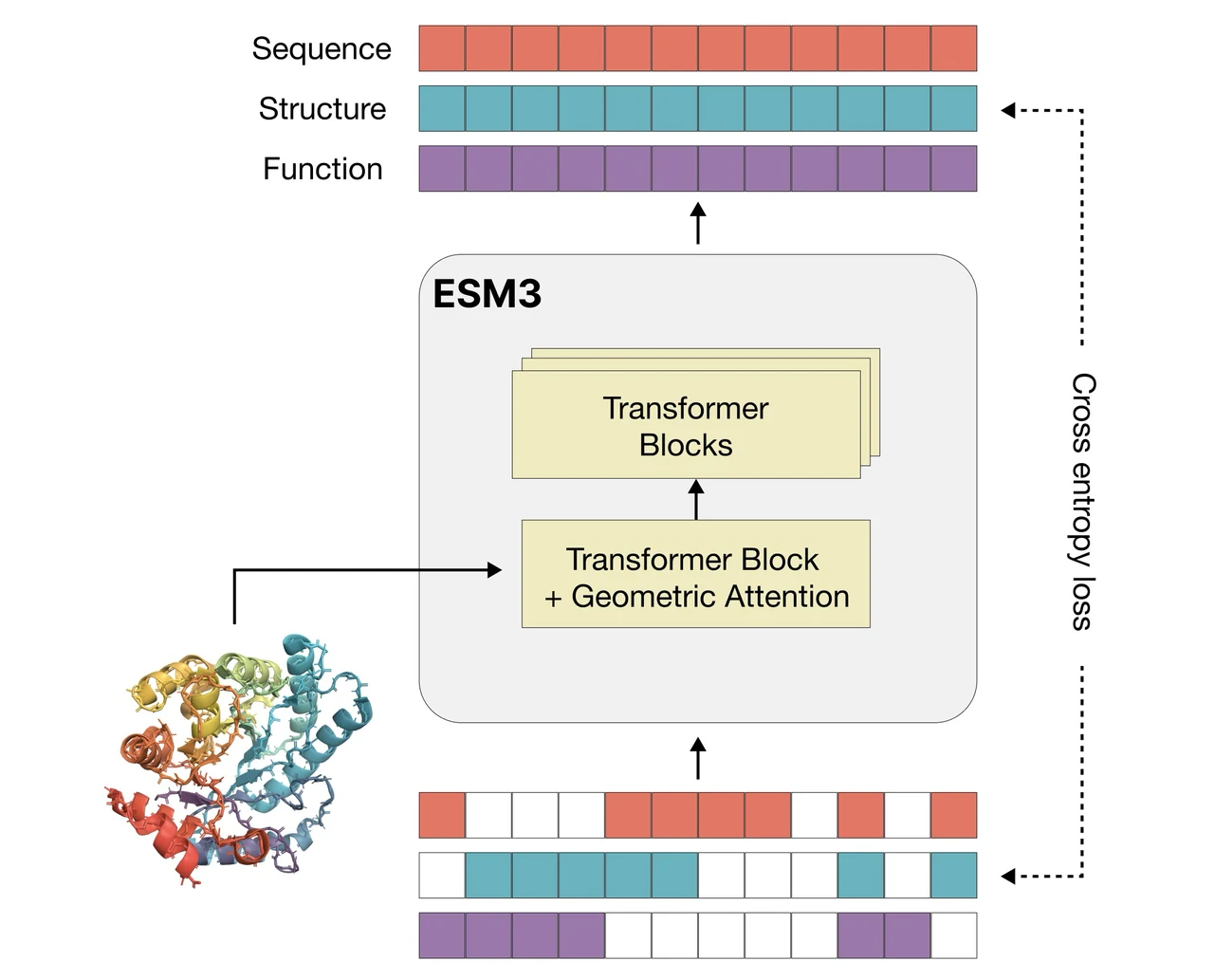In a remarkable leap forward for synthetic biology, the AI model ESM3, developed by Evolutionary Scale, has achieved a significant milestone. By simulating half a billion years of evolutionary processes, ESM3 enables the creation of custom proteins, opening up a world of possibilities in biotechnology and beyond.
Imagine a world where we can design proteins as easily as we draft blueprints for a building. This isn’t a distant dream but a burgeoning reality thanks to the new work of Evolutionary Scale and their AI model, ESM3. By simulating a staggering 500 million years of evolution, ESM3 is not just pushing the boundaries of synthetic biology—it’s redefining them. This innovative approach allows researchers to create proteins from scratch, offering a tantalizing glimpse into a future where biology is programmable and tailored to our needs.
But why does this matter to you? Well, the implications are vast and deeply personal. From transforming drug discovery to pioneering new materials and even tackling climate change through enhanced carbon capture, the potential applications of ESM3 touch on many aspects of our lives. Imagine personalized medicine that caters to your unique genetic makeup or sustainable solutions that help preserve our planet for future generations. While the possibilities are thrilling, they also come with a responsibility to navigate ethical and safety considerations. Lets explore how ESM3 is not just a technological discovery but a beacon of hope for addressing some of the world’s most pressing challenges.
AI Protein Design
TL;DR Key Takeaways :
- ESM3, developed by Evolutionary Scale, simulates 500 million years of evolution to create custom proteins, marking a significant advancement in synthetic biology.
- The AI model is trained on 2.78 billion protein sequences, enabling it to design novel proteins with specific characteristics, such as a new green fluorescent protein (GFP).
- ESM3’s protein design capabilities have wide-ranging applications, including drug discovery, material science, carbon capture, and personalized medicine.
- Evolutionary Scale plans to release open-source versions of ESM3 and collaborate with AWS and Nvidia to enhance accessibility and computational power.
- Ethical and safety concerns are critical as programmable biology advances, necessitating responsible use and oversight to prevent misuse and unintended consequences.
The Power of Evolutionary Scale and ESM3
Evolutionary Scale stands at the forefront of making biology programmable. Their flagship AI model, ESM3, draws its strength from an extensive dataset of 2.78 billion protein sequences. This generative AI model harnesses the power of evolutionary simulation to design proteins that don’t exist in nature, such as a novel green fluorescent protein (GFP).

ESM3’s capabilities extend far beyond simple protein analysis. By examining protein sequences, 3D structures, and functions, the model can craft proteins with specific characteristics tailored to various applications. This level of precision in protein engineering marks a significant advancement in the field.
Transforming Protein Design
The ability of ESM3 to design new proteins from scratch represents a quantum leap in protein engineering. This breakthrough allows for the creation of proteins with precise specifications, enhancing our understanding of protein functions and interactions at a molecular level.
Key features of ESM3’s protein design capabilities include:
- Ability to create proteins that don’t exist in nature
- Focus on 3D protein structures for functional effectiveness
- Precision in tailoring proteins to specific needs
- Enhanced understanding of protein interactions
The model’s emphasis on 3D protein structures ensures that the designed proteins are not just theoretically viable but also functionally effective in real-world applications. This approach bridges the gap between computational design and practical implementation, a crucial step in advancing the field of synthetic biology.
AI Simulated 500 million years of evolution to create custom proteins ESM3
Stay informed about the latest in AI Model by exploring our other resources and articles.
Wide-Ranging Applications and Implications
The potential applications of ESM3 span a diverse range of fields, each with significant implications for scientific advancement and societal benefit.
In drug discovery, ESM3 can identify and design proteins that target specific diseases with unprecedented precision. This capability has the potential to accelerate the development of new therapies, potentially reducing the time and cost associated with bringing new drugs to market.
The field of material science stands to benefit greatly from ESM3’s custom proteins. These engineered proteins could lead to the development of innovative biomaterials with unique properties, opening up new possibilities in fields such as tissue engineering and regenerative medicine.
Environmental sustainability efforts could receive a significant boost from ESM3’s capabilities in carbon capture technology. By designing proteins specifically tailored for efficient carbon sequestration, the model could contribute to the development of more effective solutions to combat climate change.
Personalized medicine represents another promising area for ESM3’s application. The model’s ability to design proteins tailored to individual genetic profiles could lead to more effective, targeted treatments with fewer side effects.
Enhancing Accessibility and Collaboration
Recognizing the fantastic potential of ESM3, Evolutionary Scale is taking steps to provide widespread access to access to this new technology. Plans are underway to release open-source versions of the model, allowing researchers and developers worldwide to use its capabilities.
Collaborations with cloud computing giants like AWS and Nvidia aim to enhance the model’s accessibility and computational power. These partnerships will:
- Assist broader research and innovation
- Enable more scientists and developers to access ESM3
- Accelerate advancements in protein engineering
- Foster a collaborative ecosystem in synthetic biology
By making ESM3 more accessible, Evolutionary Scale is paving the way for a new era of collaborative research and development in programmable biology.
Addressing Ethical and Safety Concerns
The advent of programmable biology through AI models like ESM3 brings with it important ethical and safety considerations. The ability to design life forms from scratch necessitates responsible use and oversight to prevent potential misuse.
Key ethical questions that need to be addressed include:
- The implications of programming life at a molecular level
- Potential unintended consequences of engineered proteins
- Making sure equitable access to the benefits of this technology
- Balancing innovation with safety and ethical considerations
Making sure safety in AI applications is paramount as these technologies continue to evolve. Robust regulatory frameworks and ethical guidelines will be crucial in guiding the responsible development and application of AI-driven protein design.
Looking Ahead: Future Prospects
The development of more powerful AI models like ESM3 holds the potential to transform fields from biotechnology to environmental science. As these technologies advance, we can anticipate:
- More precise and efficient drug development processes
- Innovative solutions for environmental challenges
- Advancements in personalized medicine
- New frontiers in material science and bioengineering
However, balancing innovation with safety and ethical considerations remains crucial. As AI-driven protein design becomes more advanced, the focus must remain on responsible development and application to harness its full potential for societal benefit.
The journey of ESM3 and similar AI models in synthetic biology is just beginning. As we stand on the brink of a new era in programmable biology, the possibilities are as exciting as they are vast. With careful stewardship and continued innovation, these technologies have the potential to address some of humanity’s most pressing challenges and unlock new realms of scientific discovery. Learn more over on the EvolutionaryScale website.
Media Credit: Wes Roth
Filed Under: AI, Top News
Latest TechMehow Deals
Disclosure: Some of our articles include affiliate links. If you buy something through one of these links, TechMehow may earn an affiliate commission. Learn about our Disclosure Policy.
